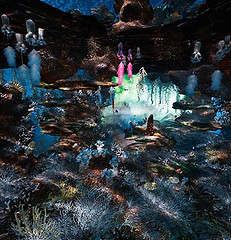
#savethemermaids

Reduce Your Carbon Footprint
The coral reefs in Mer have been devastated in part by ocean acidification and temperature rise caused by global warming. Mer scientists promote enacting good climate change policies that address environmental justice, greenhouse-gas-emissions mitigation, adaptation, and finance, as the best and fastest way to reduce the CO2 admissions of humans. When you’re on land, you can also help by lowering your individual CO2 footprint. Here's how...
4 Ways to Lower Your Carbon Footprint
Walk it Off with the Mer App
-
The average Fitbit recommends 10,000 steps per day, making a 35 mile week.
-
Connect with the Lost City of Mer App: start tracking your steps and winning rewards!

Eat A Plant Based Diet
-
One-fifth of global carbon emissions come from people consuming a meat-centric Western diet: "If cattle were their own nation, they would be the world's third-largest emitter of greenhouse gases" - Drawdown.org
-
Emissions, as they are now, could be reduced as much as 70%, if half of the world's population adopted a plant-based diet.
-
Plant-based diets also tend to be healthier - making you, and the planet, breathe a whole lot easier.

Keeping Cool Isn't So Cool
-
Every refrigerator and air conditioning unit contains chemicals called HFCs that have a 1,000 to 9,000 times greater capacity to warm the atmosphere than CO2.
-
These refrigerants release 90% of their emissions at the end of their life, demanding effective disposal for those units already in circulation.
-
To learn ways in which you can reduce your impact with refrigerants, and help save an estimated 89.7 gigatons of CO2 over the next 30 years, visit: Drawdown.org
Wait, Don't Waste!
-
35% of food in high-income economies, like the United States, is thrown out at the consumer level. Willful food waste is a cultural phenomenon that rejects food based on bumps, bruises, coloring, or simply over buying/ordering.
-
Changing this culture of waste, specifically in higher-income countries, begins with changing consumer behavior.
-
“After taking into account the adoption of plant-rich diets, if 50 percent of food waste is reduced by 2050, avoided emissions could be equal to 26.2 gigatons of carbon dioxide. Reducing waste also avoids the deforestation for additional farmland, preventing 44.4 gigatons of additional emissions.” - Drawdown.org
More Resources
-
If you are looking for more ways you can have an impact on your carbon footprint, click the earth to the right. Learn about air travel emissions, more about a plant-based diet, and how rising populations can affect carbon emissions.
-
"Agitating and voting and writing letters and op-eds, make far more sense" for promoting systematic change - Gavin Schmidt director of NASA Goddard Institute for Space Studies



Pollution
You stopped the polluted water from killing the secret coral garden in Mer; now can you be heroic on land. Learn about the three largest pollution threats to our oceans and coral reefs.
Oil Pollution
-
Leaching from factories accounts for 45% of oil in our waters.
-
Oil pollution decimates the habitats and lives of marine wildlife - destroying a fragile ecosystem.
Agricultural Runoff

-
Industrial animal agriculture contributes to sea temperature rise, ocean acidification and the creation of nitrogen-rich "dead zones".
-
These hypoxic "dead zones" are the result of algal blooms which use up all the oxygen in the water, rendering it uninhabitable.

Stop Using Plastic
-
There are estimated 5 trillion pieces of plastic in our oceans - including micro-plastics which are ingested by marine life, as well as humans.
-
Do your small part to help, and stop using plastic when you can.


Overfishing
Along with the impact of climate change, the magical aquatic creatures that populated Mer's waters were fished unsustainably, leaving the ecosystem barren. Here are some ways to bring life back to Mer.
Blue Economy
-
The blue economy "harnesses the potential of our oceans, seas, lakes, and rivers to improve the lives of all, particularly people in developing states, women, youth and indigenous peoples."
-
Coastal communities rely on marine resources for food, income, and culture.
-
Humans rights issues exist in fishing communities, such as "detention without trial, child labor, unsafe working conditions, and gender-based violence." Human rights violations undermine current attempts to reform fishery sectors in developing countries and produce increased vulnerability and the marginalization of certain groups.
-
Humans rights advocacy can be an effective way to support the sustainable development of fisheries.
-
To read more, click the fish!
Overfishing & Blast Fishing
-
Depletion of key reef species drastically alters the coral ecosystems.
-
Fishing gear can inflict serious physical damage to the reefs, which takes 15-25 years to recover.
-
The use of explosives for fishing destroys both the food chain and the coral where the fish nest and grow - killing off the entire food chain.

Sustainably Sourced Seafood (if you must eat it)
-
By supporting wild caught and sustainable fishing practices, you can support a system of fishing that does not put a strain on the oceans fish populations, uses gear that does little damage to the environment, does not endanger the jobs of a sustainable fisherman or the traditional community knowledge for nature conservation.
-
If you need a little assistance figuring out which types of seafood are the most environmentally friendly to eat, click the fish!

Join In
Just as you are working with Athina to rebuild Mer, it takes a community to make significant and lasting change. Through the lens of environmental justice, policy change has the largest and most immediate impact. Click on the groups below to engage with work that is geared towards an intersectional view of climate change!
Greenpeace
Sierra Club
The Sierra Club is a nonprofit organization with several million members. It has multiple policy change campaigns that organize and unite people around taking political steps towards environmental justice and green policy. Check out their website to see which campaigns you can join, and how to get started!
Ocean Warriors
Ocean Warriors is a show that aired on Animal Planet. From the Antarctic's remote Southern Ocean, to the coral reefs of Tanzania and the vast tuna fisheries of the Western Pacific, a global coalition of activists, scientists and journalists prepare to stare down poachers, tear up illegal fishing networks and bring outlaws to justice.
The 2030 Agenda for Sustainable Development, adopted by all United Nations Member States in 2015, provides a shared blueprint for peace and prosperity for people and the planet, now and into the future. At its heart are the 17 Sustainable Development Goals (SDGs), which are an urgent call for action by all countries - developed and developing - in a global partnership. They recognize that ending poverty and other deprivations must go hand-in-hand with strategies that improve health and education, reduce inequality, and spur economic growth – all while tackling climate change and working to preserve our oceans and forests.






























